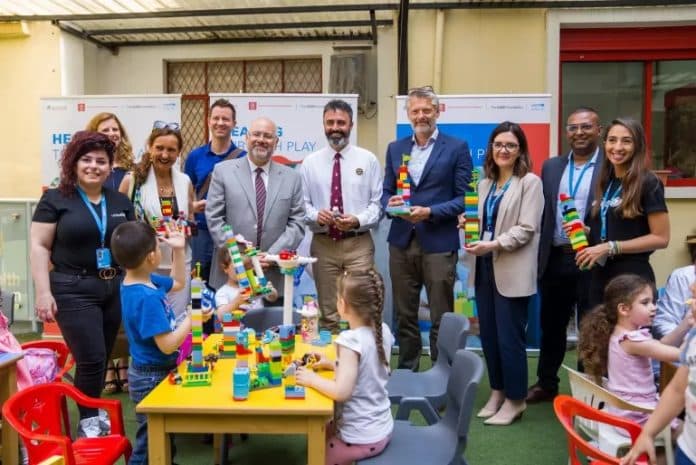The first-ever International Day of Play, to be observed on 11 June 2024, marks a significant milestone in efforts to preserve, promote, and prioritize playing so that all people, especially children, can reap the rewards and thrive to their full potential.
Play is considered to have a positive impact on promoting tolerance, resilience, and facilitating social inclusion, conflict prevention, and peacebuilding. In recognition of this, the United Nations Convention on the Rights of the Child has enshrined play as a fundamental right of every child under Article 31.
The Lebanese Ministry of Public Health (MoPH) in partnership with UNICEF, the Danish Ministry of Foreign Affairs and the LEGO Foundation, launched the ‘Heal through Play’ project to provide the most vulnerable children with safe spaces and tools for children to play, learn, express themselves, and return to a sense of normalcy.
Play and mental health
’Heal through Play’ integrates the LEGO® play box activities into the child-friendly spaces including primary healthcare centers and targets specific mental health outcomes. Facilitated sessions will leverage the opportunity for play to help foster healing, improve mental health, and strengthen psychosocial well-being for children whose world has been turned upside down.
Thousands of play materials have been distributed across Lebanon. In addition to the direct support for children offered by the integration of LEGO® play boxes into UNICEF’s existing programmes, and in collaboration with the National Mental Health Program, this project will also explore how play can be linked more closely to mental health and psychosocial support.

Photo: Photo with images of FAO, MONUSCO, UNICEF Afghanistan, UNICEF, UNAMA and Adobe Stock
Helping children build a future
Minister Dr Firass Abiad highlighted the importance of the project and the role of mental development during children’s growth, emphasizing how essential playing is. He stated, “This project will not be limited to one center but will include a number of primary healthcare centers because it is important to give the necessary attention to children’s mental and psychological health to strengthen and help them build their future.”
The Minister of Public Health thanked the partners, noting the continuous support provided by UNICEF to all the ministry’s projects, especially those related to children. He also thanked the LEGO Foundation and Denmark for their support to the health sector in Lebanon.
Danish Ambassador to Lebanon, Kristoffer Vivike said: “LEGO has a very special place in most Danes hearts, and almost all Danish children play with LEGO. Playing with LEGO inspires creativity and learning for children at all ages: with a box of LEGO you can build anything. We are delighted to be a part of this partnership with the LEGO Foundation, UNICEF and the Lebanese Ministry of Health, and I am thrilled that thousands of children in Lebanon will gain access to this incredible toy and learning tool. Not least in a situation where many children – Lebanese, Syrian and Palestinian – are facing extremely tough times. I am confident this partnership will bring hope and joy to many.”

Numerous facilitators trained
“Supporting children to feel secure in expressing their thoughts and feelings can help shape their understanding of events and environments in ways that may reduce feelings of anxiety and insecurity,” said Ettie Higgins, UNICEF Deputy Representative in Lebanon. “UNICEF partnership with the LEGO Foundation will provide the most vulnerable children with the skilled support to improve their mental health and psychosocial wellbeing while providing training in psychological first aid for facilitators to improve recognition of children in distress.”
In addition to the donation of the play materials over 1364 facilitators are being trained in play-based methods that help children develop a broad set of skills—all in child-friendly spaces and primary healthcare centers.

